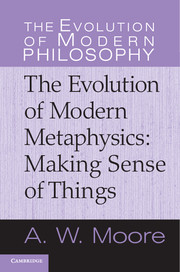Chapter 6 - Fichte
Transcendentalism versus Naturalism
from Part One - The Early Modern Period
Published online by Cambridge University Press: 05 June 2012
Summary
German Philosophy in the Immediate Aftermath of Kant
No sooner had Kant presented his critical philosophy to the world, and the world begun to assimilate it, than there was a proliferation of what looked like transcendent metaphysics of the most egregious kind, far more excessive and far more extravagant than anything that either he or Hume had been trying to combat. Within four years of Kant’s death Hegel had published a book in whose preface he gave the following outline of his conception of what he called ‘the living substance’.
[The] living substance is being which is in truth subject, or … is … actual only in so far as it is the movement of positing itself, or is the mediation of its self-othering with itself. This substance is, as subject, pure, simple negativity, and is for this very reason the bifurcation of the simple; it is the doubling which sets up opposition, and then again the negation of this indifferent diversity and of its antithesis…. Only this self-restoring sameness, or this reflection in otherness within itself … is the true. It is the process of its own becoming, the circle that presupposes its end as its goal, having its end also as its beginning; and only by being worked out to its end, is it actual. (Hegel (1979), ¶18, emphasis in original, capitalization removed)
To an untrained eye this appears to be an unlovely mixture of obscurity, jargon, and barbarism, too far beyond the semantic pale even to admit of epistemic censure, though aspiring (insofar as one can tell) to be pretty far beyond the normal epistemic pale as well. We can readily imagine the alacrity with which Hume would have committed it to the flames, or the urgency with which Kant would have asked Hegel what he took himself to be doing with this bizarre mishmash of concepts and pseudo-concepts, this unruly concatenation of undistorted and distorted ideas of reason, in which little enough qualifies even for the title of ‘empty’ thought.
- Type
- Chapter
- Information
- The Evolution of Modern MetaphysicsMaking Sense of Things, pp. 143 - 161Publisher: Cambridge University PressPrint publication year: 2011

